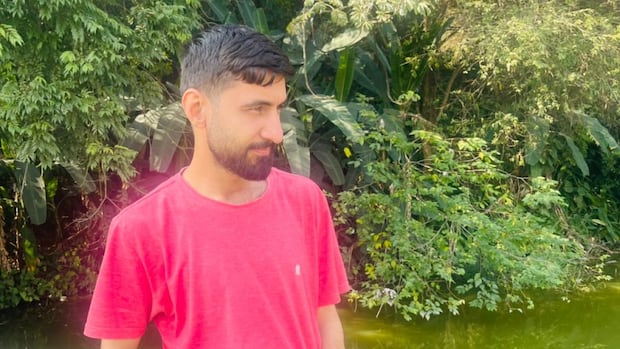
It’s difficult for Shafiqa Jalali to talk about her son Mohammad Younesi without crying.
Jalali, her husband, their four adult children and daughter-in-law all found asylum in Canada after fleeing the Taliban’s rule in Afghanistan in 2024.
The family secured humanitarian visas from Brazil and paid human smugglers thousands of dollars to guide them by land through 10 countries, including Peru, Ecuador, Colombia, as well as the Darién Gap, a 100-kilometre stretch of jungle connecting North and South America that’s considered one of the most treacherous migration pathways in the world.
“We knew that we might lose our lives,” 57-year-old Jalali told CBC News through a Farsi translator. “But we were still hopeful to make it.”
Shafiqa Jalali says she has a hard time sleeping, eating or going out knowing her son is incarcerated in the U.S. and faces deportation to Afghanistan, where his life would be at risk. (Evan Mitsui/CBC)
Although they didn’t travel as a family unit, everyone made it to Canada safely and was granted refugee protection — except Jalali’s youngest son, Mohammad. The 27-year-old was arrested by ICE agents in Arizona and has been in an immigration detention facility in Livingston, Texas, just north of Houston, for nearly a year.
Jalali says she fears U.S. officials will send Younesi back to Afghanistan, where he was previously tortured by the Taliban for his human rights work.
“I want the Canadian government to help my son, so that he can come here and be united with us, so that we can have a normal life,” said Jalali.
“He is not doing well.”
‘My life is in danger in Afghanistan’
Under the Canada-U.S. Safe Third Country Agreement, people must claim asylum in whichever country they get to first, which means they can’t leave the U.S. to seek refugee status in Canada — although there are some exceptions, including for family members of Canadian citizens or permanent residents, like Younesi.
A U.S. judge has granted Younesi permission to travel to the Canadian border to claim asylum. But his lawyer’s petition to Immigration, Refugees and Citizenship Canada for a temporary resident permit to allow that was rejected in June.
“He is currently facing removal to Afghanistan,” said Erin Simpson with the firm Landings LLP.
In a letter to Simpson, a deputy migration program officer at the Consulate General of Canada’s Los Angeles office wrote that temporary resident permits “can be issued only in exceptional circumstances, or on occasion, when compelling Canadian interests are served. After a careful and sympathetic review balancing all of the factors, I have determined that there are insufficient grounds to merit the issuance of a permit in your case.”
This photo of Mohammad Younesi was texted by his smugglers to his brother to prove he was alive and that he had made it to the U.S.-Mexico border. (Submitted)
In an email statement to CBC News, the Ministry of Immigration, Refugees and Citizenship Canada wrote that due to privacy legislation, it could not comment on Younesi’s case.
It is absolutely not an overstatement to say that it is a matter of life and death.- Erin Simpson, Mohammad Younesi’s lawyer
“It is absolutely not an overstatement to say that it is a matter of life and death,” said Simpson. “And that has been our consistent message to the [immigration] minister and our plea for this permit to be issued.”
According to a signed affidavit submitted to U.S. officials, Younesi fled Afghanistan after being kidnapped, beaten and forced to perform field labour in December 2023 because of his work with an NGO assisting vulnerable women and girls.
“My life is in danger in Afghanistan, and returning would mean facing violence and persecution by the Taliban once again,” reads the sworn declaration.
Long trek
The Taliban retook control of the country in 2021 after the withdrawal of U.S. forces and other allies. The United Nations reports that women’s rights have deteriorated drastically as a result, with “oppressive directives that target the rights, autonomy, and very existence of Afghan women and girls.”
The family of Mohammad Younesi, who fled Taliban persecution in Afghanistan, are pictured at a home provided by Romero House, which helps settle new refugees in Toronto. (Evan Mitsui/CBC)Younesi said he escaped by running away after being sent to work in the fields. “I seized the opportunity to flee and hid in my aunt’s house. Since then, the Taliban have continued searching for me, forcing me to flee Afghanistan.”
Younesi left Afghanistan with his brother and pregnant sister-in-law in July 2024. The trio travelled to Iran, where they obtained a humanitarian visa to go to Brazil. They made the arduous journey through South and Central America together, but were separated in Mexico.
Although the expectant couple were detained briefly by immigration officials in California, they were allowed to continue their travels to Canada, unlike Younesi who was arrested and held by U.S. authorities.
Mohammad Younesi, seen in a park in Sao Paulo, Brazil, before he, his brother and sister-in-law started their arduous journey to North America. (Submitted)
Soon afterward, Jalali, her husband and three adult children made the same journey. They, too, were arrested by ICE officials, but were eventually released from custody with instructions to attend U.S. immigration court hearings. After that, they continued on their journey to Canada to claim asylum.
“Anyone who ends up [in detention] would be scared. It was scary for us and it’s scarier for Mohammad, because he has been there for a much longer time,” said Jalali, who often speaks to her son by phone.
“He says that he doesn’t know what will happen to him and to his life.”
‘It’s very difficult for the family to really move forward’
Jalali and her family are being housed by Romero House, a refugee settlement centre in Toronto. The organization’s executive director, Francesca Allodi-Ross, said the family has had difficulty celebrating the fact they’ve been accepted as refugees with Younesi’s future in question.
“It’s very difficult for the family to really move forward with this hanging over them,” said Allodi-Ross.
Francesca Allodi-Ross, executive director at Romero House, says Canada is known for being a place of welcome for refugees and immigrants. She believes the government should live up to that reputation by granting a temporary resident permit for Mohammad Younesi so he can be reunited with his family. (Evan Mitsui/CBC)
“We know what’s happening in the U.S. It’s very unpredictable. People are being deported to countries that are not even their own, like El Salvador or Mexico or Sudan. And so every day that passes, there’s a risk that he will be sent somewhere unsafe.”
Unable to hold back her tears, Jalali said she has a hard time sleeping, eating or going out knowing her son is incarcerated in the U.S.
“I have been there and when I think about Mohammad, it just breaks my heart.”
Allodi-Ross said Younesi is alone and has no one to protect him. But that could change.
“I think there’s a lot of talk about what it means to be Canadian right now,” she said.
“Being a place of welcome for refugees and immigrants and people who want to build a better life, is an important part of who we are. And so I’m calling on the Canadian government to live up to that reputation and take this simple, humane act of granting the temporary resident permit for Mohammad and helping him reunite with his family and be safe.”





